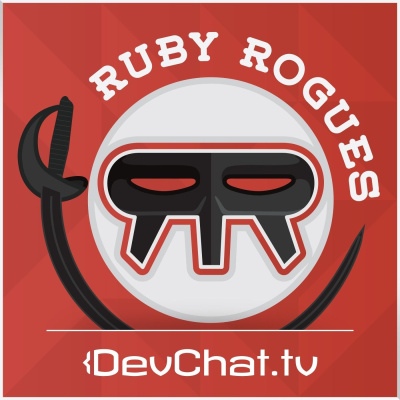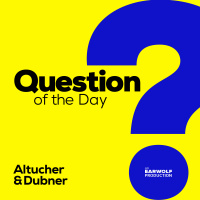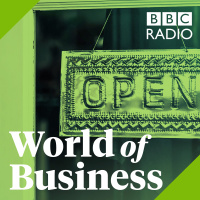Sinopse
All ruby related podcasts from Devchat.tv, including: - Ruby Rogues - My Ruby Story - Ruby Rants
Episódios
-
RR 460: How to Brainstorm Introverts with DeeDee Lavinder
19/05/2020 Duração: 01h10minDee Dee Lavinder talks with the Rogues about how we can create space for introverts to participate in discussions, thereby getting their input in situations where we otherwise would not. She provides some tips for extroverts to invite the input, Luke brings his patented sarcasm to the table, we discuss some pitfalls and Dee really brings some fantastic advice to the table for those trying to moderate discussions as well as for those of us having small discussions with our colleagues.PanelJohn EppersonLuke StuttersGuestDeeDee LavinderSponsorsResolve DigitalSpringboard | $500 Scholarship Available for Candidates who Apply with Code "DASPRINGBOARD" "The MaxCoders Guide to Finding Your Dream Developer Job" by Charles Max Wood is now available on Amazon. Get Your Copy Today! LinksQuiet: The Power of Introverts in a World That Can't Stop Talking: Susan CainPicksJohn Epperson:Harry Dresden FilesMaking Gumbo at home #totally-worthLuke Stutters:Missing 411: The HuntedDeeDee Lavinder:Follow DeeDee on Twitter > @ddla
-
RR 459: Mutation Testing with Dave Aronson
12/05/2020 Duração: 01h08minJavaScript Remote Conf 2020May 13th to 15th - register now!Dave Aronson joins the Rogues to talk about Mutation Testing in Ruby. The conversation starts with a discussion of what mutation testing is. They discuss the benefits and approaches before diving into implementation details.PanelCharles Max WoodDave KimuraJohn EppersonLuke StuttersGuestDave AronsonSponsorsSpringboard | $500 Scholarship Available for Candidates who Apply with Code "AISPRINGBOARD" "The MaxCoders Guide to Finding Your Dream Developer Job" by Charles Max Wood is now available on Amazon. Get Your Copy Today! Linksseattlerb/heckledgollahon/mutestmbj/mutant: Mutation testing for Ruby - Semantic code coveragePicksCharles Max Wood:The Iron Druid ChroniclesFlip Timer & stopwatch on the App StoreRockAutoCar-Part.comDave Kimura:Dewalt Cut Out ToolJohn Epperson:Air Compressor for dustingLuke Stutters:iKKEGOL USB Single Foot Switch ControlDave Aronson:Follow Dave on Twitter > @DaveAronson, Codosaurus, LinkedInFlaviar - referral codejoe's anc
-
RR 458: Rules of OOP in Pictures with Ivan Nemytchenko
05/05/2020 Duração: 48minJavaScript Remote Conf 2020May 13th to 15th - register now!Ivan Nemytchenko is a freelancer. He's a speaker and conference organizer. Ivan spoke at RailsConf about abstract Object Oriented programming ideas and how they can be expressed with pictures. The discussion goes into learning processes and how to create visual representations that help people understand Ruby, Rails, or other concepts.PanelDave KimuraJohn EppersonLuke StuttersGuestIvan NemytchenkoSponsorsSpringboard | $500 Scholarship Available for Candidates who Apply with Code "DASPRINGBOARD" "The MaxCoders Guide to Finding Your Dream Developer Job" by Charles Max Wood is now available on Amazon. Get Your Copy Today! LinksChernoff Facesdmikhr/DudeGL - "Anthropomorphic UML": visualization of code and OOP concepts in a form of human body.dmikhr/Dudity - Analyze Rails code with stick dudesdmikhr/DudesHub - Visualize code diffs in GitHubPicksDave Kimura:Drifting Ruby - Discount Code - learnfromhometroessner/reek: Code smell detector for RubyKubernetes
-
RR 457: Upgrading to Rails 6
28/04/2020 Duração: 37minJavaScript Remote Conf 2020May 13th to 15th - register now!Dave has been upgrading some of his Rails apps. Chuck has gone through several upgrades in his past work and is working on some apps that need the upgrade. Listen to 2 veteran Rails developers talk through the issues of upgrade from different versions of Rails to the latest version.PanelCharles Max WoodDave KimuraSponsorsResolve DigitalSpringboard | $500 Scholarship Available for Candidates who Apply with Code "AISPRINGBOARD" "The MaxCoders Guide to Finding Your Dream Developer Job" by Charles Max Wood is now available on Amazon. Get Your Copy Today! LinksRailsDiffjs2coffee 2.0 — convert JavaScript to CoffeeScriptapp/assets/config/manifest.jsPicksCharles Max Wood:Rich Dad's CASHFLOW QuadrantRRU 104: How to Start a Side Hustle as a Programmer with Mani VayaDevchat.tv Remote ConferencesDevchat.tv Remote meetupsDave Kimura:Drifting Ruby - Discount Code: learnfromhomeFollow Ruby Rogues on Twitter > @rubyroguesAdvertising Inquiries: https://redcircle.
-
RR 456: Ruby for Good :) with Sean Marcia
21/04/2020 Duração: 52minJavaScript Remote Conf 2020May 13th to 15th - register now!Sean Marcia organizes Ruby For Good—an organization for building technology to solve the world's problems and an in person meetup held online this year. Sean talks about founding Ruby For Good and some of the projects it has been responsible for creating.PanelCharles Max WoodJohn EppersonLuke StuttersGuestSean MarciaSponsorsSpringboard | $500 Scholarship Available for Candidates who Apply with Code "DASPRINGBOARD" "The MaxCoders Guide to Finding Your Dream Developer Job" by Charles Max Wood is now available on Amazon. Get Your Copy Today! LinksRuby for Good - Making the world gooderCode for AmericaThe Code for America Brigade NetworkPicksCharles Max Wood:Ruby by the Bay / Ruby for GoodRuby Virtual Meetup - April 20 at 4pm MDTRuby Virtual Meetup - Europe/Africa/Middle East - April 23 at 9am MDTJohn Epperson:Disney+Ruby Meetup: OnlineLuke Stutters:GitHub - larsch/ocra: One-Click Ruby Application BuilderSean Marcia:Follow Sean on Twitter > @seanmar
-
RR 455: What's Up, Rogues?
14/04/2020 Duração: 45minJavaScript Remote Conf 2020May 13th to 15th - register now!This episode is a roundup discussion about what the podcast hosts have going on these days. John talks about going freelance working on Ruby, Rails, and React Native. John and Chuck riff on the pros and cons of React Native. Luke then jumps in and talks about a crash-and-burn he ran into with building reports. John sympathizes based on his past experiences. The rest of the show comprises the panel filling in with what they're working on or learning.PanelCharles Max WoodJohn EppersonLuke StuttersSponsorsSpringboard | $500 Scholarship Available for Candidates who Apply with Code "AISPRINGBOARD"____________________________________________________________ "The MaxCoders Guide to Finding Your Dream Developer Job" by Charles Max Wood is now available on Amazon. Get Your Copy Today! ____________________________________________________________LinksfastlaneSwaggerAbout Swagger SpecificationJavaScript Remote Conf 2020GatsbyJSGridsomePicksCharles Max Wood:Journa
-
RR 454: Music and Factory Bot with Daniel Colson
07/04/2020 Duração: 01h09minJavaScript Remote Conf 2020May 14th to 15th - register now!Daniel Colson, from Thoughtbot and maintainer of Factory Bot, joins Dave Kimura, Luke Sutters, Tom Rossi, and John Epperson and discuss the transition from a Music career to a development career. We also dive into Factory Bot and its use cases.PanelDave KimuraJohn EppersonTom RossiLuke StuttersGuestDaniel ColsonSponsorsResolve Digital____________________________________________________________ "The MaxCoders Guide to Finding Your Dream Developer Job" by Charles Max Wood is now available on Amazon. Get Your Copy Today! ____________________________________________________________LinksDoctrine | Ruby on RailsFalsehoods Programmers Believe About Names | Kalzumeus Softwareworking together · thoughtbot/guidesinclusive meetings · thoughtbot/guidesHow to Get Better at Pair ProgrammingPicksDave Kimura:Action TextHand Sanitizer and Washing Hands (Properly)John Epperson:Plantronics Voyager 5200 Bluetooth HeadsetLuke Stutters:Boom3D, best Volume booster & equ
-
RR 453: Ruby Next: Get future Ruby changes now with Vladimir Dementyev
31/03/2020 Duração: 52minJavaScript Remote Conf 2020May 14th to 15th - register now! We talk with Vladimir Dementyev about Ruby Next, its use cases and why you might want to get features from newer versions of Ruby in your current versionPanelDave KimuraJohn EppersonTom RossiGuestVladimir Dementyev____________________________________________________________ "The MaxCoders Guide to Finding Your Dream Developer Job" by Charles Max Wood is now available on Amazon. Get Your Copy Today! ____________________________________________________________PicksDave Kimura:brew install ctopIllustration Gallery by ManyPixels | Open-Source Editable IllustrationsJohn Epperson:PowerballTom Rossi:TreadmillVladimir Dementyev:Follow Vladimir on Twitter > @palkan_tula, GithubNumi. Beautiful calculator app for Mac. Follow Ruby Rogues on Twitter > @rubyrogues Special Guest: Vladimir Dementyev. Advertising Inquiries: https://redcircle.com/brandsPrivacy & Opt-Out: https://redcircle.com/privacyBecome a supporter of this podcast: https://www.spreaker
-
RR 452: The History and Personalities of Ruby with Chris O’Sullivan
17/03/2020 Duração: 59minChris O’Sullivan joins the Rogues to talk about the people who influenced Ruby and how it’s shaped the community and technology we have today.PanelCharles Max WoodDave KimuraJohn EppersonGuestChris O'SullivanSponsorsResolve Digital____________________________________________________________ "The MaxCoders Guide to Finding Your Dream Developer Job" by Charles Max Wood is now available on Amazon. Get Your Copy Today! ____________________________________________________________Links209 JSJ TypeScript with Anders Hejlsberg“DHH's whoops video”Mr. Neighborly's Humble Little Ruby BookJim Weirichruby/rake: A make-like build utility for Ruby.Quick Interview with Martin Sadler of WorkingWithRails.commiloops (Emilio TaguaRailsConf 2008 - O'Reilly Conferences, May 29 - June 01, 2008, Portland, Oregonwhy the lucky stiffwhy's (poignant) Guide to RubyZed Shawhttps://gilesbowkett.comObject Property Value Shorthand in JavaScript with ES6Parentheses in Ruby | Why, Dave, WhySeattle.rb style no longer valid when curly braces are
-
RR 451: Pair Programming with Ian Norris
03/03/2020 Duração: 56minDavid Kimura and John Epperson talk with Ian Norris on his experiences with Pair Programming. We discuss misconceptions, when pair programming works and when it doesn’t, remote paring and different types of pair programming.Panel:Dave KimuraJohn EppersonGuest:Ian NorrisSponsors:Resolve Digital____________________________________________________________ "The MaxCoders Guide to Finding Your Dream Developer Job" by Charles Max Wood is now available on Amazon. Get Your Copy Today! ____________________________________________________________Links:Ruby by the Bay / Ruby for Good - Making the world gooderRubyConf 2019 - Lightning Talks - Ian NorrisBackerKitPicks:Dave Kimura:Visual Studio Live ShareEasiest wall FIX EVERJohn Epperson:Jim Butcher's Codex Alera SeriesPaper Towel Rolls - makes great toys for your kidsIan Norris:Follow Ian on Twitter > @TheProphetBrtha, Github, BlogOn Pair Programming Follow Ruby Rogues on Twitter > @rubyrogues Special Guest: Ian Norris. Advertising Inquiries: https://redcircle.c
-
RR 450: Writing Ruby for the Apple II with Colin Fulton
25/02/2020 Duração: 57minColin Fulton has written a Ruby implementation in assembly for the Apple II. He's also got a fondness for the impossible and impractical applications of software. He walks through how he approached writing a somewhat limited version of Ruby for a old and limited machine. He also talks through other ways to explore the limits of Ruby and other programming languages.Panel:Charles Max WoodDave KimuraJohn EppersonGuest:Colin FultonSponsors:Resolve Digital____________________________________________________________ "The MaxCoders Guide to Finding Your Dream Developer Job" by Charles Max Wood is now available on Amazon. Get Your Copy Today! ____________________________________________________________Links:Ruby on the AppleThat Works?! Quines and Other Delightfully Useless ProgramsPicks:Charles Max Wood:New Devchat.tv Podcast - Clean CodersStar Trek: PicardDave Kimura:Guillotine Paper CutterJohn Epperson:Clint's Salsa - Medium MexicanReact Native Hot ReloadingColin Fulton:Follow Colin on Twitter - @PeterQuines, GitH
-
RR 449: Everything worth doing has already been done with Zachary Schroeder
18/02/2020 Duração: 01h05minIn this episode of Ruby Rogues, Zachary and the panelists speak about doing small projects. They cover half-done projects, when is a project really “done” and staying focused. An unfinished project is not a failure and making a small project helps to make a complete project.PanelDave KimuraJohn EppersonGuestZachary SchroederSponsorsResolve DigitalRedisGreen________________________________________________________ "The MaxCoders Guide to Finding Your Dream Developer Job" by Charles Max Wood is now available on Amazon. Get Your Copy Today! ____________________________________________________________Linkshttps://www.youtube.com/watch?v=taYx6Dy6dwIhttps://github.com/robobluebird/ruby-lofiRuby | GosuRuby2dPicksDave Kimura:Noble Chair EpicDewalt Trim RouterJohn Epperson:Lagavulin 16 Year Old Scotch WhiskyOffice ChairZachary Schroeder:Zachary's GithubRiding a BikeThe Thermals - Live on KEXPSpecial Guest: Zachary Schroeder. Advertising Inquiries: https://redcircle.com/brandsPrivacy & Opt-Out: https://redcircle.c
-
RR 448: How To Avoid Catastrophes with Jon Druse
04/02/2020 Duração: 41minJon Druse is a developer from Tennessee and has been using Rails for 15 years. He starts the show by sharing some of the background behind his RailsConf talk “How To Lose 50 Milion Records in 5 Minutes” and the various mistakes that were made that lead to such a dramatic loss. The loss of these records lead the company to refactor and rewrite the entire app in MongoDB. Jon talks about the decision to use Mongo. One of the main points of his talk was that their mistake was discovered because they were trying to figure out wy Elastic Search was getting slow. He counsels listeners to avoid working your way into a poor status quo and accepting it rather than doing something to fix it. If this happens, it can lead to the sudden failure of your app. In the talk, he mentions ‘landmines’, which are things in your app you don’t want to touch and you don’t deal with it until later. In his company, they left these landmines alone and then did something they thought was unrelated, and everything blew up. He stresses the
-
RR 447: All About Kafka and Oracle with Bob Quillin and Karthik Gaekwad
21/01/2020 Duração: 46minBob Quillin and Karthik Gaekwad are on the Oracle developer relations team. Karthik has been on Ruby Rogues previously, and he explains how he went from the Kubernetes team to developer relations. They begin the show by explaining what Kafka is, the leading open-source event streaming platform that Oracle is compatible with. It allows cloud developers to build, publish, and subscribe models for streams of records in addition to many other functions. Systems that used to take a long time to make have become very small and simple with Kafka. Kafka stands out from other message queueing systems because of its robust nature and scalability. Bob goes into more depth about the evolution of Kafka and the panel discusses some different use cases, concluding that Kafka works best for projects with a large amount of data coming in and for making real-time decisions. Bob and Karthik talk about other things Kafka can do beyond the message queue, such as building streams from specific patterns. They talk about when you sh
-
RR 446: Development Environments
14/01/2020 Duração: 58minToday the panel is talking about their development environments and preferences. Most of them run on Macs, but they talk about other operating systems. They discuss some of the pros and cons of using Apple products. While Apple has conveniences to help you restore data, many of them have had issues with cabling and the fact that Macs are not easily extendable. They agree that the speed at which a development environment gets up and running is less about the hardware and more about how the environment is set up.The conversation turns to which development platforms they are running. They discuss the value of Docker as a development environment. The panel compares the features of database management systems such as MySQL, MariaDB, and Postgress. David feels that getting up and running in an environment is the most important thing, but the panel challenges him to consider the maintenance required in some environments. The Ruby experts discuss the merits of using RVM and what they like about it, testing libraries
-
RR 445: Location Services with Mithun Dhar
07/01/2020 Duração: 01h01minMithun leads development relations at HERE Technologies which specializes in building location services and location platforms. A lot of location is so seamlessly integrated we don’t even have to think about it, but it’s quite complex. He talks about how location services work, such as a ride-sharing app. He talks about some of the tools and data available from HERE Technologies for people who want to use location services. The panel discusses when to use services from companies like HERE and when you should try to do it on your own. Mithun talks about other ways HERE’s services can be utilized. The panel discusses how companies can get mapping so wrong, and Mithun talks about some of the complexities involved in mapping. David Kimura talks about some of his experiences with creating a location app, and the panel talks about the unlimited applications of location services.Mithun talks about how location services are tested and how they are impacting the public sector and the future of mobility. Mobility is th
-
RR 444: Rails Against the Machine
31/12/2019 Duração: 46minBrittany Martin, Lead Web Developer at the Pittsburgh Cultural Trust joins the panel today to talk about her talk "Rails Against The Machine". She has given this talk at Southeast Ruby, Rubyconf MY and Ruby on Ice.Brittany Martin works for the Pittsburgh Cultural Trust as the nonprofit’s Lead Web Developer, where she is part of the team that develops, supports and maintains the Trust’s ticketing and festival web applications. She is a certified AWS Developer and the host of the 5by5 Ruby on Rails podcast. Under her alter-ego, Norma Skates, Brittany officiates roller derby for the Little Steel Derby Girls.Her talk's elevator pitch is as follows: "What should a development team do when a few bad users threaten their application? Online businesses are plagued with trolls and bots. Learn how your team can leverage features from RoR and AWS to monitor and (secretly) segment bad actors using automation and behavioral triggers."Brittany and the panel address questions such as "When is it better to block a user inste
-
RR 443: Sharing Tips from the Trench with Sven Akerman Jr.
24/12/2019 Duração: 53minSven Akerman Jr. is the chief architect at Outlook Insight. Today he and the panel are talking about the process behind development, specifically how Sven helped improve the software development process at his previous employer. When he started, they had a formal Scrum/Agile process for the first 5 years, but recognized gaps using key performance indicators like turnaround time. So the company implemented the single piece flow method, which ensures that all developers are focused on one thing from start to finish before moving on. As a company, they have a maximum of 2 products in play at a time, with two in focus. Some of the benefits of single piece flow are that it reduces context switching and increases group knowledge and involvement. Sven talks about how the method was implemented in the company, and admits that it takes a really efficient delivery pipeline to move things this quickly. For those that don’t have much to do with a project, the ‘bored void’ was filled with a list of other important things
-
RR 442:Ruby Rogues Live at GitLab Commit 2019
17/12/2019 Duração: 53minIn this episode of Ruby Rogues, Charles Max Wood interviews speakers at GitLab Commit 2019. Eddie Zaneski from Digital Ocean talks about "Creating a CI/CD Pipeline with GitLab and Kubernetes in 20 minutes", Shamiq Islam from Coinbase talks about "Closing the SDLC Loop- Automating Security" and Jasmine James, from Delta Airlines, discusses " How Delta Became Cloud Native-Avoiding the Vendor Lock".Eddie, Shamiq, and Jasmine give the 5 min "elevator pitch" for the talks they gave at the conference.In his talk, Eddie deploys a fake startup going through the whole pipeline: building the application, containerizing an application and shipping it off to Kubernetes.Shamiq, talks about how the conventional approach to security is to consider it at the very end after all developer has wrapped up their work and why that should change.Jasmine explains more in-depth what it means for a big corporation like Delta to be in a Vendor Lock.SponsorsSentry | Use the code “devchat” for $100 creditCloud 66 - Pain Free Rails Deploy
-
RR 441: Solidus with Alessandro Desantis
10/12/2019 Duração: 31minAlessandro Desantis is the director of Nebulab and is currently working on Solidus. After talking a little bit about how Nebulab got started, he describes what Solidus is. Solidus is a free, open source eCommerce platform built in Ruby on Rails that gives you complete control over your store. Three things that set it apart from other eCommerce platforms are that it is governed by a single company and that the focus is on quality and backwards compatibility. One of their biggest goals is to make Solidus streamlined, and Alessandro talks about how they handle it with the complex business logic involved in eCommerce. He talks more about the governance of Solidus and the different teams involved. Alessandro admits that Solidus has fewer features than some of its competitors, but this makes it very powerful and customizable. It can be tacked onto any Rails engine and you can pick and choose the things you want. Solidus was made with fewer features because of the unique nature of each eCommerce store. The creators












